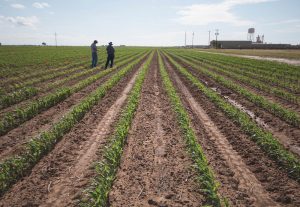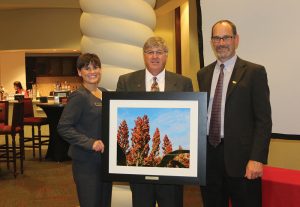
Swipe For More >
Checkoff Newsletter – Spring 2020
Advanced Cropping Solutions for Sorghum Coming Soon
A robust pipeline of herbicide technologies for sorghum will be making their debut beginning this growing season. Many growers have heard the buzz surrounding not one, but three different up-and coming technologies for weed and grass control in sorghum. One technology in particular will be demonstrated at several field days this summer across the Sorghum Belt.
igrowth® by Alta Seeds and UPL
 Alta Seeds from Advanta has developed non-GMO imidazolinone (IMI) herbicide-tolerant technology for grain sorghum. This unique technology is known as igrowth® and will enable farmers to spray an IMI herbicide for pre or postemergence control of both broadleaf and grass weeds, a technology to which sorghum farmers have not yet had access. Traditionally, these types of herbicides would cause severe damage to a sorghum crop, but with the ability to plant an igrowth® hybrid, an IMI herbicide can safely be applied. UPL Limited (UPL) is in the process of labeling the IMI herbicide imazamox for use in igrowth® sorghum. The company has not released the official name of the chemical at the time of writing.
Alta Seeds from Advanta has developed non-GMO imidazolinone (IMI) herbicide-tolerant technology for grain sorghum. This unique technology is known as igrowth® and will enable farmers to spray an IMI herbicide for pre or postemergence control of both broadleaf and grass weeds, a technology to which sorghum farmers have not yet had access. Traditionally, these types of herbicides would cause severe damage to a sorghum crop, but with the ability to plant an igrowth® hybrid, an IMI herbicide can safely be applied. UPL Limited (UPL) is in the process of labeling the IMI herbicide imazamox for use in igrowth® sorghum. The company has not released the official name of the chemical at the time of writing.
Because the technology is a recessive, non-GMO technology developed through traditional breeding, the sorghum product is export friendly and maintains its value to global customers and marketplaces.
Growers can attend the official launch of igrowth® sorghum at Alta Seeds Sorghum Frontiers field days this summer which will be held at three different farms. There will be an indoor learning session with CEU opportunities and a field plot tour where growers will be able to see igrowth® sorghum varieties in the field, test plots demonstrating the effectiveness of imizamox, UPL’s companion herbicide, as well as other Alta Seeds technologies like APHIX, their sugarcane aphid tolerant sorghum hybrids. Both Alta and UPL will have representatives present at the field days to answer questions and present information. Lunch will also be provided at the following events:
- May 28 – Corpus Christi, TX
- Aug. 18 – Enid, OK
- Sept. 2 – Larned, KS
Growers who attend the field days will have the first opportunity to pre-order igrowth® sorghum for the 2021 planting season. To learn more about the Alta Seeds Sorghum Frontiers field days for igrowth® sorghum and sign up for updates, visit AltaSeeds.Advantaus.com/igrowth.
Double Team™ by S&W Seed Company and ADAMA
At Commodity Classic 2020, S&W Seed Company and ADAMA announced their collaboration on the continued development of the ACCase tolerant technology in sorghum. The ACCase tolerant sorghum (ATS) was developed by S&W in collaboration with the Sorghum Checko using traditional, non-GMO breeding techniques. The Double Team™ system will enter the marketplace through S&W’s Sorghum Partners® brand and is expected to be commercially available in limited quantities in the spring of 2021. While S&W continues work on ACCase tolerant hybrids, ADAMA will develop weed control systems and support stewardship of the technology. ADAMA is also pursuing a label for quizalofop herbicide to be used over-the-top of ATS sorghum for grass control. S&W and ADAMA are collaborating to have extensive field trials in 2020 to verify further hybrid performance and refine the use of the Double Team™ system in an overall weed management program. To learn more about the Double Team™ system, visit SorghumPartners.com/sw-seed-company-and-adama-announce-double-team.
Inzen Technology by Corteva® Agriscience
Corteva® Agriscience continues to make progress on their Inzen sorghum technology, which is the name given to their sorghum hybrids tolerant to sulfonylurea (SU) herbicides. These are typically referred to as ALS-tolerant hybrids. The herbicide labeled to be used in Inzen sorghum is nicosulfuron, a well-known herbicide used in corn. Nicosufluron was labeled for use in Inzen sorghum under the trade name Zest™, which provides over-the-top grass control in sorghum. Although the herbicide was fully approved for use in 2016, time was still needed to develop suitable hybrids for planting in the U.S. Corteva® plans to hold in-field training for their field staff at selected sites this summer to analyze and showcase the Inzen technology.
All three technologies are expecting a commercial launch for either the 2021 or 2022 growing seasons if developments continue at the current pace. The Sorghum Checkoff will be working closely with Alta Seeds, S&W and Corteva to keep growers informed and educated on important events, stewardship guidelines and best management practices surrounding these exciting new herbicide technologies. With three new cropping solutions entering the marketplace, proper stewardship will be essential to ensure U.S. sorghum growers have opportunities to increase yield potential and combat troublesome weeds in sorghum like never before.
Sorghum Checkoff Board Launches Sustainability Initiative, Hires Everhart-Valentin as Sustainability Director
 The United Sorghum Checkoff Program has launched an initiative to increase market value for growers by positioning sorghum as a sustainable solution for food, feed and energy sectors that serves the global community and its needs for nutrition and environmental health.
The United Sorghum Checkoff Program has launched an initiative to increase market value for growers by positioning sorghum as a sustainable solution for food, feed and energy sectors that serves the global community and its needs for nutrition and environmental health.
The board also recently named Kira Everhart-Valentin as the organization’s first sustainability director. Everhart-Valentin will be responsible for developing and leading the sorghum industry’s sustainability initiatives and will continually assess opportunities for investment and collaboration to increase the value of sorghum for farmers and industry stakeholders.
“We are delighted to have Kira join the Sorghum Checkoff,” Sorghum Checkoff Executive Director Florentino Lopez said. “Her unique skill set and experience will bring a meaningful perspective to developing and maintaining a sustainability strategy that appropriately highlights sorghum’s potential as an environmentally sustainable crop while still respecting the importance of maintaining economic stability for sorghum producers.”
Everhart-Valentin is a graduate of Kansas State University and has a master’s degree in political science and a bachelor’s degree in agricultural communications and journalism in addition to bachelor’s degrees in modern languages and international studies.
She has worked in the sorghum industry for a number of years, beginning with serving Western Kansas farmers and businesses. Most recently, she served as the program coordinator with the USAID Feed the Future Innovation Lab on Collaborative Research on Sorghum and Millet at Kansas State University, working extensively internationally.
In this role, she managed a global program on sorghum and millet with partners across nine different countries. The program linked U.S. teams with international teams across various areas of sorghum innovation and technology, including genetic improvement, agronomic practices and end-use processing.
“I’m excited to help define what sustainability means to sorghum as a crop and an industry,” Everhart-Valentin said. “I hope to connect sorghum’s many environmentally sustainable qualities to end users and consumers in a way that responds to the increasing demand for sustainable production practices while bringing value back to the sorghum grower for utilizing those responsible practices.”
Sorghum Checkoff Board Directors Sworn In, Officers Elected
Five Sorghum Checkoff board directors were sworn in during the December 2019 board meeting in Lubbock, Texas.
Returning to the board is Kent Martin of Carmen, Oklahoma. Newly appointed to the board are James Haase of Eads, Colorado; Jeffery D. Zortman of Fowler, Kansas; Kendall Hodgson of Little River, Kansas; and Joshua Birdwell of Malone, Texas. 
The newly sworn in board members were appointed by the U.S. Agriculture Secretary Sonny Perdue in August and will serve a three-year term.
New leadership was also elected during the December board meeting. Craig Poore of Alton, Kansas, will serve as chairman, Kent Martin of Carmen, Oklahoma, as vice chairman, Boyd Funk of Garden City, Kansas, as treasurer and Jim Massey of Robstown, Texas, as secretary.
 Martin Kerschen of Garden Plain, Kansas; Clayton Short of Assaria, Kansas; and Daniel Krienke of Perryton, Texas, completed their terms as board directors. The exiting board directors were honored for their service to the Sorghum Checkoff at a ceremony on Dec. 11.
Martin Kerschen of Garden Plain, Kansas; Clayton Short of Assaria, Kansas; and Daniel Krienke of Perryton, Texas, completed their terms as board directors. The exiting board directors were honored for their service to the Sorghum Checkoff at a ceremony on Dec. 11.
“We extend our deepest appreciation to Martin, Clayton and Daniel for their many years of service on the board,” said Sorghum Checkoff CEO Tim Lust. “Their countless hours of dedication and hard work will continue to generate results into the future for sorghum farmers and this industry.”
For more information on how to become a Sorghum Checkoff board member, visit SorghumCheckoff.com.
###
This story originally appeared in the Spring 2020 Issue of Sorghum Grower magazine in the Checkoff Newsletter department.


